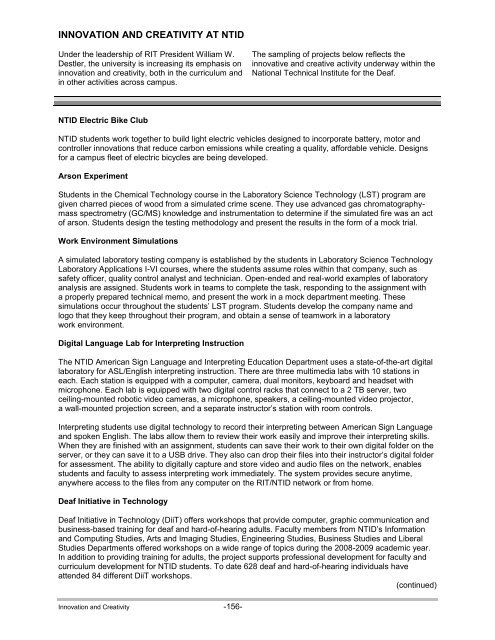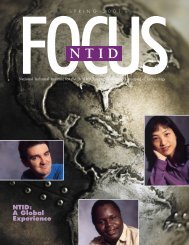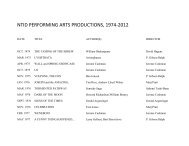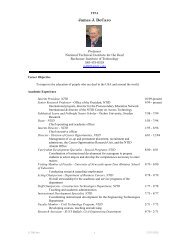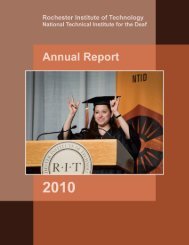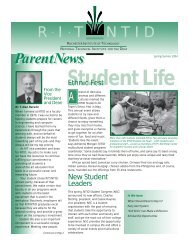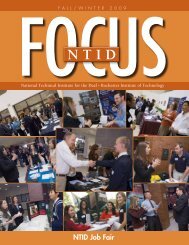Social Security Disability Insurance (SSDI) - National Technical ...
Social Security Disability Insurance (SSDI) - National Technical ...
Social Security Disability Insurance (SSDI) - National Technical ...
Create successful ePaper yourself
Turn your PDF publications into a flip-book with our unique Google optimized e-Paper software.
INNOVATION AND CREATIVITY AT NTID<br />
Under the leadership of RIT President William W.<br />
Destler, the university is increasing its emphasis on<br />
innovation and creativity, both in the curriculum and<br />
in other activities across campus.<br />
NTID Electric Bike Club<br />
Innovation and Creativity -156-<br />
The sampling of projects below reflects the<br />
innovative and creative activity underway within the<br />
<strong>National</strong> <strong>Technical</strong> Institute for the Deaf.<br />
NTID students work together to build light electric vehicles designed to incorporate battery, motor and<br />
controller innovations that reduce carbon emissions while creating a quality, affordable vehicle. Designs<br />
for a campus fleet of electric bicycles are being developed.<br />
Arson Experiment<br />
Students in the Chemical Technology course in the Laboratory Science Technology (LST) program are<br />
given charred pieces of wood from a simulated crime scene. They use advanced gas chromatographymass<br />
spectrometry (GC/MS) knowledge and instrumentation to determine if the simulated fire was an act<br />
of arson. Students design the testing methodology and present the results in the form of a mock trial.<br />
Work Environment Simulations<br />
A simulated laboratory testing company is established by the students in Laboratory Science Technology<br />
Laboratory Applications I-VI courses, where the students assume roles within that company, such as<br />
safety officer, quality control analyst and technician. Open-ended and real-world examples of laboratory<br />
analysis are assigned. Students work in teams to complete the task, responding to the assignment with<br />
a properly prepared technical memo, and present the work in a mock department meeting. These<br />
simulations occur throughout the students’ LST program. Students develop the company name and<br />
logo that they keep throughout their program, and obtain a sense of teamwork in a laboratory<br />
work environment.<br />
Digital Language Lab for Interpreting Instruction<br />
The NTID American Sign Language and Interpreting Education Department uses a state-of-the-art digital<br />
laboratory for ASL/English interpreting instruction. There are three multimedia labs with 10 stations in<br />
each. Each station is equipped with a computer, camera, dual monitors, keyboard and headset with<br />
microphone. Each lab is equipped with two digital control racks that connect to a 2 TB server, two<br />
ceiling-mounted robotic video cameras, a microphone, speakers, a ceiling-mounted video projector,<br />
a wall-mounted projection screen, and a separate instructor’s station with room controls.<br />
Interpreting students use digital technology to record their interpreting between American Sign Language<br />
and spoken English. The labs allow them to review their work easily and improve their interpreting skills.<br />
When they are finished with an assignment, students can save their work to their own digital folder on the<br />
server, or they can save it to a USB drive. They also can drop their files into their instructor’s digital folder<br />
for assessment. The ability to digitally capture and store video and audio files on the network, enables<br />
students and faculty to assess interpreting work immediately. The system provides secure anytime,<br />
anywhere access to the files from any computer on the RIT/NTID network or from home.<br />
Deaf Initiative in Technology<br />
Deaf Initiative in Technology (DiiT) offers workshops that provide computer, graphic communication and<br />
business-based training for deaf and hard-of-hearing adults. Faculty members from NTID’s Information<br />
and Computing Studies, Arts and Imaging Studies, Engineering Studies, Business Studies and Liberal<br />
Studies Departments offered workshops on a wide range of topics during the 2008-2009 academic year.<br />
In addition to providing training for adults, the project supports professional development for faculty and<br />
curriculum development for NTID students. To date 628 deaf and hard-of-hearing individuals have<br />
attended 84 different DiiT workshops.<br />
(continued)


